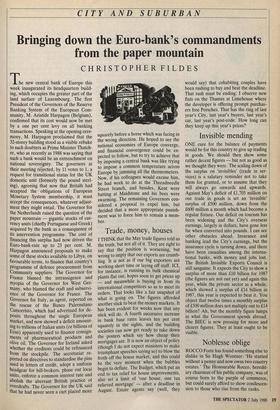Invisible mending
ONE cure for the balance of payments would be for this country to give up trading in goods. We should then show some rather decent figures — but not as good as we thought they were. The scaling down of the surplus on invisibles' (trade in ser- vices) is a salutary reminder not to take them for granted, or to assume that they will always go onwards and upwards. Against May's deficit of £1,705 million on our trade in goods is set an 'invisible' surplus of £500 million, down from the £600 million a month which had become a regular fixture. Our deficit on tourism has been widening and the City's overseas earnings, largely in dollars, have gone less far when converted into pounds. I can see other obstacles ahead. Insurance and banking lead the City's earnings, but the insurance cycle is turning down, and there have been casualties among the interna- tional banks, with money and jobs lost. The British Invisible Exports Council is still sanguine. It expects the City to show a surplus of more than £10 billion for 1987 (the figures are not out yet) and again this year, while the private sector as a whole, which showed a surplus of £14 billion in 1987, this year is expected to beat it. You object that twelve times a monthly surplus of £500 million does not multiply out to £14 billion? Ah, but the monthly figure lumps in what the Government spends abroad. The BIEC is now pressing for more and clearer figures. They at least ought to be visible.














































 Previous page
Previous page